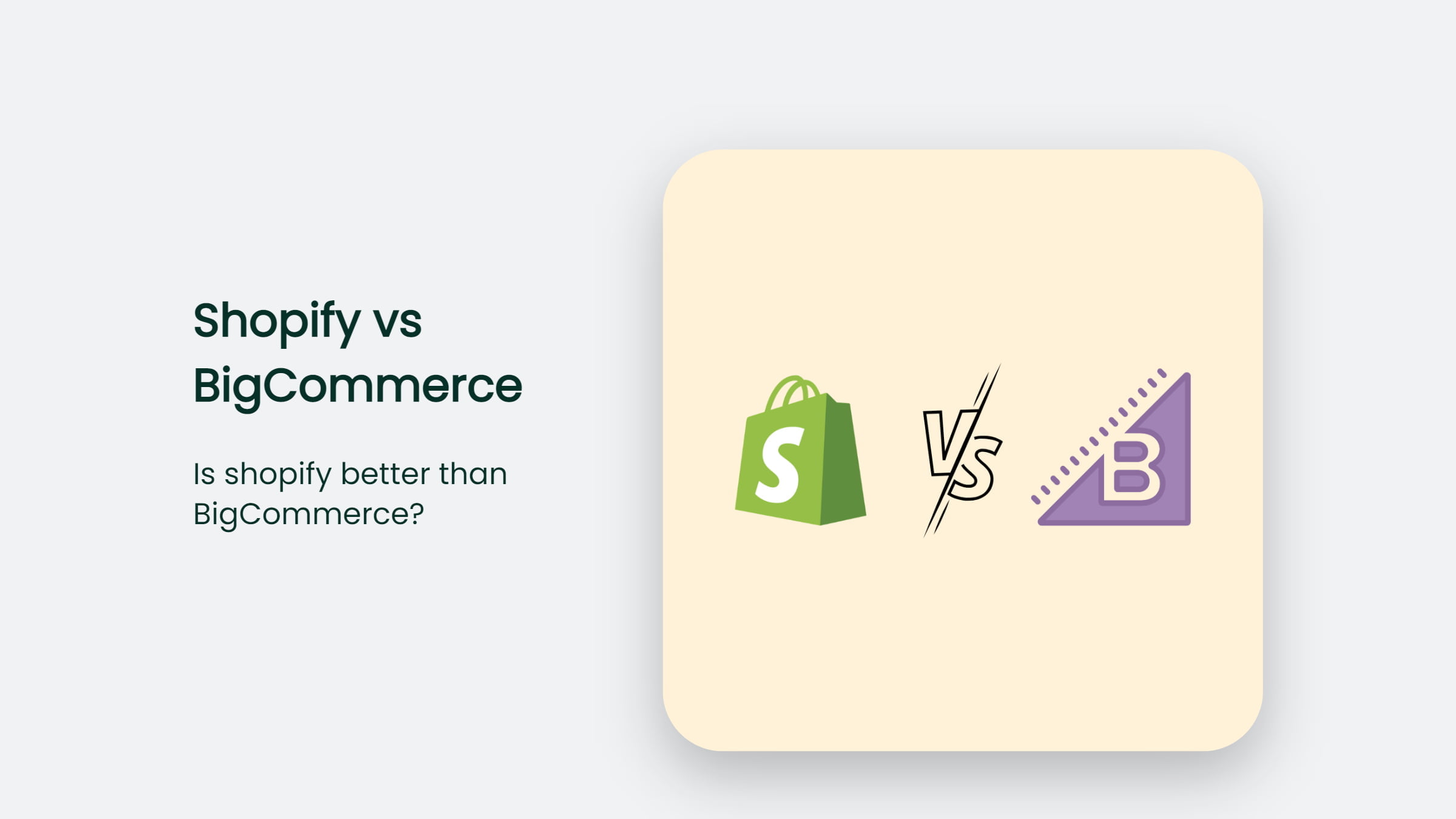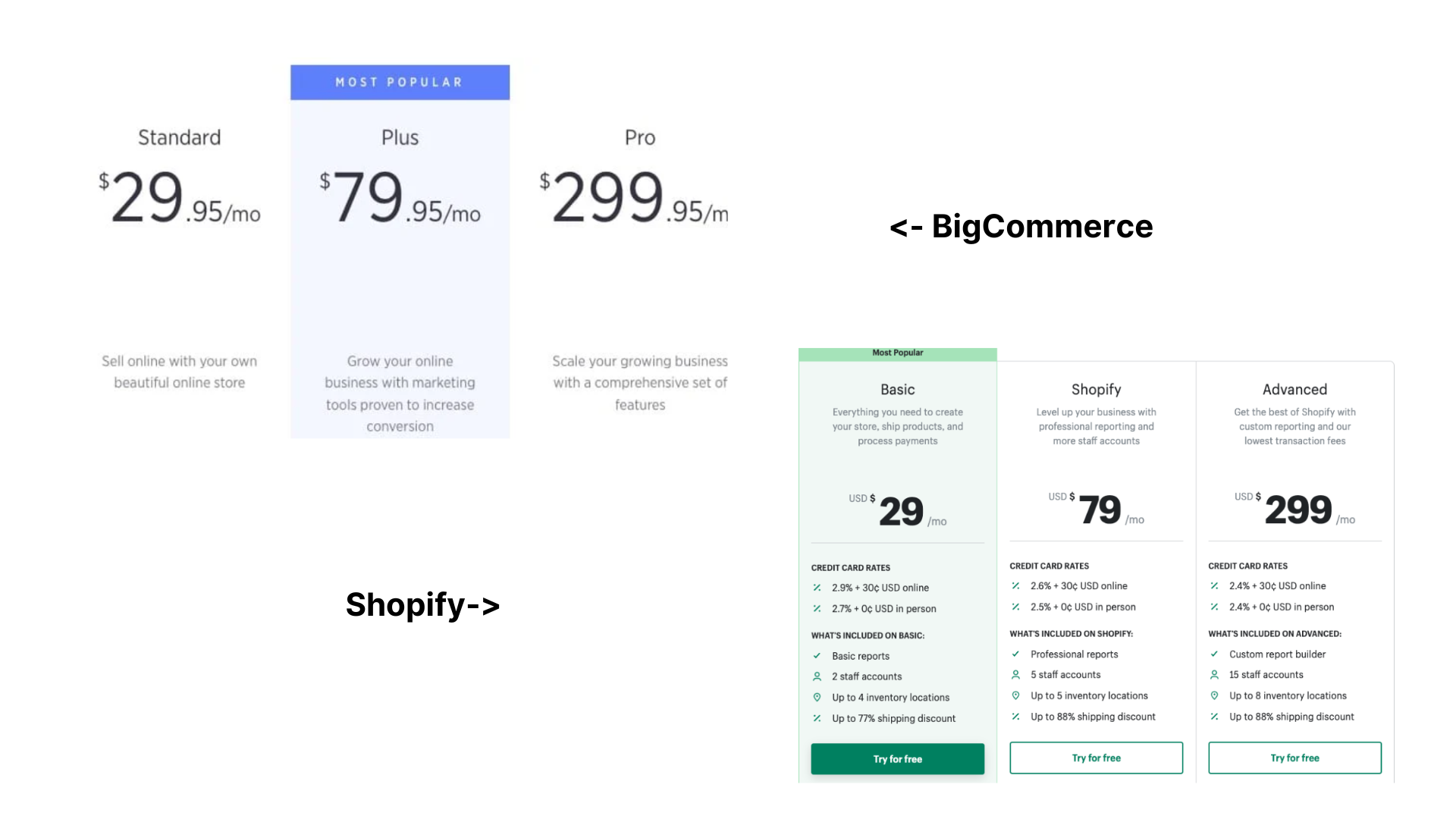

Shopify vs BigCommerce. Is Shopify Better Than BigCommerce?

As Seen On
If you’re in the market for a new eCommerce platform, you might feel a little like Goldilocks.
Shopify? Too expensive. Magneto? A little too complicated. BigCommerce? Hmm…just might be perfect!
But wait just one second before you make your decision.
Is Shopify better than BigCommerce? So the battle of Shopify vs BigCommerce starts!
Table of Contents

What are Shopify and BigCommerce?
Shopify and BigCommerce are two of the most popular eCommerce platforms today. Shopify is a cloud-based platform that offers users a comprehensive set of tools for building and managing their online stores.
BigCommerce, on the other hand, is a self-hosted platform that gives users more control over the design and development of their stores.
Both platforms offer various features, including support for multiple languages and currencies, different payment methods, and multiple shipping options.
In addition, both Shopify and BigCommerce offer users the ability to create unlimited products and categories and track inventory levels and manage customer orders.
While there are some differences between these two platforms, they provide businesses with everything they need to build successful online stores.
Now let’s get into the good stuff.
Shopify vs BigCommerce
Let’s see the differences between Bigcommerce and Shopify based on key traits.
BigCommerce vs Shopify: Pricing

When it comes to pricing, Shopify and BigCommerce both have pretty similar plans.
Shopify’s cheapest plan starts at $29 per month, while BigCommerce’s most affordable plan starts at $29.95 per month.
However, BigCommerce offers a few features that need to be included in Shopify’s cheapest plan, such as abandoned cart recovery and product filtering.
Shopify’s most expensive plan is $299 per month, while BigCommerce’s is $299.95 per month.
Shopify and BigCommerce have similar pricing plans, with a few slight differences.
Winner: Draw!
BigCommerce vs Shopify: Ease of Use
When it comes to ease of use, Shopify is the clear winner.
Shopify’s platform is designed to be highly user-friendly, and even users with no technical experience can create a professional-looking store in minutes.
BigCommerce’s platform is also relatively easy to use but is not as intuitive as Shopify’s platform.
In addition, BigCommerce does not offer as many features as Shopify in its cheapest plan, which can make it a little more challenging to use
Shopify is the better choice for businesses looking for an easy-to-use platform.
Winner: Shopify!
BigCommerce vs Shopify: Design and Templates
Both Shopify and BigCommerce offer users a wide range of design options.
Shopify offers users over 100 professional themes, all of which are fully customizable.
BigCommerce also offers users a wide selection of themes, but not all are as customizable as Shopify’s.
In addition, Shopify’s themes are generally more modern and sleek than BigCommerce’s themes.
Overall, Shopify is the better choice for businesses looking for a platform with a wide selection of modern and customizable themes.
Winner: Shopify!

Shopify vs BigCommerce: Extensions
When choosing an eCommerce platform, extensions can be a make-or-break factor. BigCommerce and Shopify offer a wide range of extensions to help businesses customize their online stores.
However, there are some critical differences between the two platforms regarding extensions.
For starters, BigCommerce offers more native extensions than Shopify. It means that more extensions are available out-of-the-box on BigCommerce, which can save businesses time and money in terms of development costs.
Additionally, BigCommerce offers a higher level of customization for extensions than Shopify. It can be helpful for businesses that need to fine-tune their extension functionality to suit their needs better.
However, Shopify does have some advantages when it comes to extensions.
Firstly, Shopify’s extensions are generally less expensive than BigCommerce’s.
Additionally, Shopify offers a broader variety of themes than BigCommerce, which can be helpful for businesses that want to change up the look and feel of their online store.
Overall, both platforms offer a great selection of extensions; it just depends on the business’s specific needs as to which platform is the better option.
Winner: Draw
BigCommerce vs Shopify: Mobile Apps
There are many things to consider when choosing an eCommerce platform, and one of the most important is whether or not the platform offers a mobile app.
In today’s world, consumers are increasingly using their smartphones and tablets to shop online, and a mobile app can make it easier and more convenient for them to do so.
BigCommerce and Shopify are two of the most popular eCommerce platforms offering mobile apps.
However, there are some critical differences between the two. First, Shopify’s app is available for both iOS and Android devices, while BigCommerce’s app is available on iOS. There is a BigCommerce app for Android devices, but it is not as up to the mark as Shopify’s platform on Android.
Second, Shopify offers a more robust set of features within its app, including managing inventory, tracking orders, and processing payments.
Third, Shopify’s app is designed to be more user-friendly and intuitive than BigCommerce’s. Ultimately, deciding which platform to use will come down to personal preference. However, if you’re looking for an eCommerce platform that offers a superior mobile experience, Shopify is a clear choice.
Winner: Shopify
Shopify vs BigCommerce: Payment processing
When it comes to payment processing, BigCommerce and Shopify are both strong contenders.
BigCommerce offers many payment options, including major credit cards, PayPal, Apple Pay, and Google Pay.
Shopify also supports a wide range of payment methods, including all major credit cards, PayPal, Amazon Pay, and Stripe.
Regarding fees, Shopify charges 2.9% + $0.30 per transaction for all major credit cards, while BigCommerce also charges 2.9% + $0.30 per transaction.
However, Shopify does have different transaction fees depending on the mode of purchase: physical purchases attract a 2.7% fee per transaction. If you use any payment gateway other than Shopify Payments, a 2% fee will be charged on every transaction.
Winner: Shopify
BigCommerce vs Shopify: Support
Shopify offers 24/7 support to all its users, regardless of their subscription level. It means that you can always get help with any issues or questions, no matter the time of day.
BigCommerce, on the other hand, only offers 24/7 support to its Enterprise level subscribers. For other users, support is only available during business hours.
Another key difference is the type of support offered. Shopify provides both email and live chat support and a vast knowledge base of articles and tutorials.
BigCommerce only offers email support, although it does have a robust knowledge base.
Finally, it’s worth noting that Shopify’s support team is widely considered to be more knowledgeable and helpful than BigCommerce’s.
So if you’re looking for an eCommerce platform with great support, Shopify is likely the better option.
Winner: Shopify

Shopify or Bigcommerce: Which One Should You Choose?
Shopify and BigCommerce are excellent choices for businesses looking to build successful online stores.
Shopify is the better choice for businesses looking for an easy-to-use platform with a wide selection of modern and customizable themes.
BigCommerce is the better choice for businesses looking for a platform with a wide range of payment options.
Frequently Asked Questions:
Is Shopify or BigCommerce better for SEO?
Both Shopify and BigCommerce offer a wide range of features that can help you optimize your website for SEO. However, Shopify is generally considered to be the better platform for SEO. It is because it offers more control over things like title tags, meta descriptions, and URL structure.
Is Shopify or BigCommerce better for beginners?
Shopify is generally considered to be the better platform for beginners. It is because it offers a more user-friendly interface and an easier learning curve. However, both platforms are relatively easy to use, which ultimately comes down to personal preference.
How much does Shopify cost?
Shopify offers three subscription plans: Basic Shopify, Shopify, and Advanced Shopify. The Basic Shopify plan starts at $29 per month, the Shopify plan starts at $79 per month, and the Advanced Shopify plan starts at $299 per month.
How much does BigCommerce cost?
BigCommerce offers four different subscription plans: BigCommerce Standard, Plus, Pro, and Enterprise. The BigCommerce Standard plan starts at $29.95 per month, the Plus plan starts at $79.95 per month, the Pro plan starts at $299.95 per month, and the Enterprise plan is priced by quote.
The Bottom Line:
Now that we’ve looked at the pros and cons of Shopify vs BigCommerce, which is the better platform for your eCommerce business?
If you’re still unsure, contact us, and we can help you figure it out. The experts at EcomIQ have years of experience working with both platforms and can advise you on which one will work better for your unique circumstances.
Don’t wait – get in touch today and let us help you take your business to the next level.
Konger
Up until working with Casey, we had only had poor to mediocre experiences outsourcing work to agencies. Casey & the team at CJ&CO are the exception to the rule.
Communication was beyond great, his understanding of our vision was phenomenal, and instead of needing babysitting like the other agencies we worked with, he was not only completely dependable but also gave us sound suggestions on how to get better results, at the risk of us not needing him for the initial job we requested (absolute gem).
This has truly been the first time we worked with someone outside of our business that quickly grasped our vision, and that I could completely forget about and would still deliver above expectations.
I honestly can't wait to work in many more projects together!
Disclaimer
*The information this blog provides is for general informational purposes only and is not intended as financial or professional advice. The information may not reflect current developments and may be changed or updated without notice. Any opinions expressed on this blog are the author’s own and do not necessarily reflect the views of the author’s employer or any other organization. You should not act or rely on any information contained in this blog without first seeking the advice of a professional. No representation or warranty, express or implied, is made as to the accuracy or completeness of the information contained in this blog. The author and affiliated parties assume no liability for any errors or omissions.

